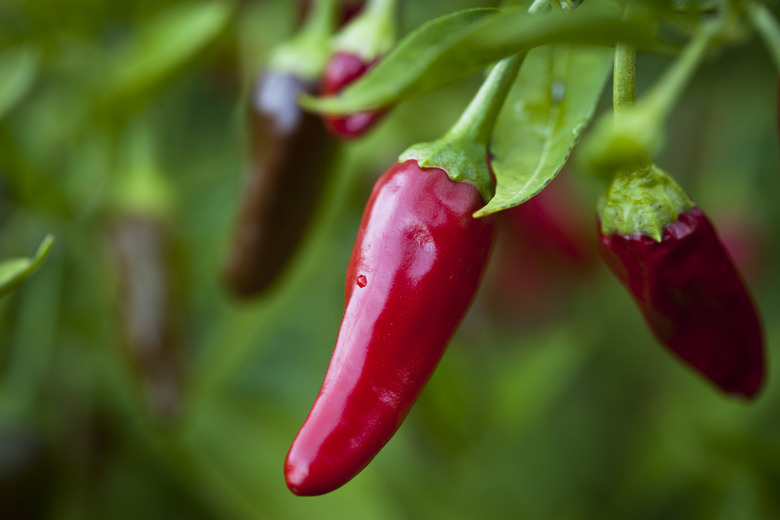Brown Spots On The Leaves Of Pepper Plants
Brown spots on the leaves of annual pepper plants (Capsicum annuum) can make you stop in your tracks. While growing peppers in your home garden is relatively easy, this popular veggie is susceptible to a variety of pest and disease problems. As soon as you notice brown spots on the plant's leaves, look for other symptoms to find the specific cause so you know how to treat the condition.
Bacterial Leaf Spot
This bacterial disease is common in pepper plants, especially in warm, humid environments. In the beginning stages, bacterial leaf spot disease causes yellow and green spots to appear on the leaves. As the disease progresses, the leaf spots appear brown, and the leaves might drop from the plant. The fruit shows signs of bacterial leaf spot as well, often displaying raised, corky spots or decay.
Treating Bacterial Leaf Spot
Unless the disease has taken over the entire plant, you should be able to save your pepper plants. Use clean, sanitized pruning shears to cut out the affected parts of the plant. Since the bacteria can spread through contact, be careful to keep the diseased parts away from other healthy plants. Remove and destroy the sections after you're finished pruning the plants.
Improve the health and strength of your pepper plants to prevent bacterial leaf spot from happening again. Fertilizing your peppers can encourage growth. When you water your pepper plant, do so at the base of the plant to avoid getting the leaves wet, which can promote bacterial growth.
Phytophthora Blight on Pepper Plants
Pathogens in soil are responsible for causing Phytophthora blight in pepper plants, especially when the soil is saturated with water. Splashing water can cause the blight pathogens to land on the leaves. When this happens, you'll see dark brown spots on the leaves, and those spots can have wilted borders. Other symptoms include dark brown or black crown tissue, root rot and dark brown lesions on upper stems. Young plants might appear watery and have a soft texture.
Managing Phytophthora Blight
Once a pepper plant is infected with blight, remove it completely from your garden. The disease can spread to other plants and ruin your entire crop. Sanitize any garden tools you use to remove the diseased plants before using them on other plants.
To prevent blight, plant your peppers in fast-draining soil. A pot or raised bed can allow the soil to drain better than garden beds. Mulching around pepper plants can prevent the soil and water from splashing onto the plant.
Pepper Plant Aphid Infestation
Soft-bodied aphids are tiny bugs that are pear-shaped with long antennae. These pests suck the sap from the leaves, creating tiny dark spots on the leaves, most often along the veins. They can also cause the leaves to curl or turn yellow. You'll often find them on the underside of leaves in clusters.
They also leave behind a sticky substance on the leaves called honeydew. Look for ants on the plants, as they like to eat the honeydew. The honeydew can also cause sooty mold to grow on the pepper plant, which makes the plant look black.
Treating Aphids on Pepper Plants
If your pepper plants are large and strong enough, use your garden hose to direct a spray of water onto the leaves to knock off the aphids. Beneficial insects, such as ladybugs, lacewings and parasitic wasps, can help control aphids. You can often order these insects and encourage them in your garden by avoiding pesticides that will also kill those beneficial bugs.
There are some nontoxic or relatively safe options for treating aphids. Diatomaceous earth is a fine powder made from sedimentary rock that dehydrates aphids by damaging their waxy exterior layer. Sprinkle it around the plants and on the leaves while they're damp to help it stick.
Neem oil can kill the aphids that are on the plant when you spray it. Insecticidal soaps can also work on aphids. Since these treatments only work on the bugs that are on the plant at the time of application, you might need to repeat the treatments weekly to control the problem. Before applying any pesticide to your plants — even organic products — check the product label. Certain plants are sensitive to insecticidal soaps and neem oil, and they may be damaged if you use these products.
